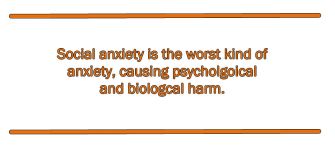Moral Anxiety Improves Us, Social Anxiety Kills

Some anxieties are indicators of healthy curiosity and strong moral fiber, while others are a source of severe stress. Knowing which is which can help you to navigate your personal, professional, and intellectual life more effectively.
Charlie Kurth, assistant professor in philosophy at Washington University in St Louis, Missouri, divides anxiety into three different categories: existential, social, and moral. The first, existential anxiety, is what we experience when we think deeply about God and the meaning (or lack thereof) with which human life is endowed. Experiencing existential curiosity is a sign of intellectual curiosity and evidence of an active imagination.

In all cases, anxiety is a physical response to situations that pose a threat to us. So when a dinner party conversation turns sour, we may wonder if we’ve embarrassed ourselves by disclosing too much personal information, accidentally insulted an acquaintance, or demonstrated other behavior that puts us at odds with the group.
This kind of anxiety, called social or status anxiety, is the least healthy, explains secular humanist author Alain de Botton in his Big Think interview:
The final type of anxiety, called moral anxiety, is caused by deliberation over decisions with ethical implications. While German philosopher Immanuel Kant described the ideal individual as one free from all anxiety, what he meant was a condition free from moral concern because everyone acted with moral responsibility in all cases. Clearly this is the ideal, but it does little to help people who experience healthy doses of moral anxiety in daily situations like making promises, maintaining friendships, and practicing virtues like patience and forgiveness.

Moral anxiety is a vehicle for civic virtue. In a 2010 study led by political scientist Michael MacKuen, and published in the American Journal of Political Science, researchers found that when people were confronted with facts contradicting their beliefs, the most typical responses were anger and anxiety. Those who experienced anxiety were more motivated to resolve this tension by conducting research, speaking more about the apparent conflict with others, and becoming more conscientious about their own beliefs and opinions.
Read more at Aeon.





